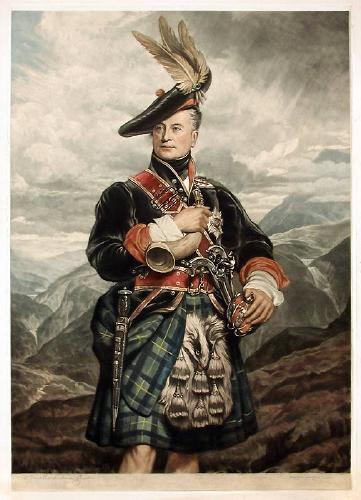
George Gordon, 5th Duke of Gordon
General George Duncan Gordon, 5th Duke of Gordon, GCB, PC (2 February 1770 – 28 May 1836), styled Marquess of Huntly until 1827, was a Scottish nobleman, soldier and politician and the last of his line.[1]
Not to be confused with Lord George Gordon.
The Duke of Gordon
Line ended
Nobleman, soldier, and politician
George Gordon
2 February 1770
Edinburgh, Kingdom of Great Britain
28 May 1836 (aged 66)
Belgrave Square, London, United Kingdom of Great Britain and Ireland
Grand Master of the Grand Lodge of Scotland (1792 to 1794)
Member of Parliament for Eye (1806 to 1807)
Keeper of the Great Seal of Scotland (1828 to 1830)
Privy Counsellor (1830 to death)
Early life[edit]
George was born at Edinburgh on 2 February 1770, the eldest son of Alexander Gordon, 4th Duke of Gordon and his wife, the celebrated Jane Gordon, Duchess of Gordon, née Lady Jane Maxwell. He was educated at Eton. He became a professional soldier and rose to the rank of general. As Marquess of Huntly, he served with the guards in Flanders from 1793 to 1794.
From May 1796 as Colonel-in-Chief, he commanded the newly created regiment: the 92nd Highlanders (usually called the "Gordon Highlanders" in honour of his family). In 1798 he served with the regiment in Ireland as Brigadier General and went with them to Holland in 1799 On 2 October 1799 he was wounded at the battle at Egmont-op-Zee in Holland. In 1806 he left the 92nd and transferred to be Colonel-in-Chief of the 42nd Regiment of Foot ("Black Watch"). From 1820 he was commander of the 1st (Royal Foot).[2]
He commanded a division in the Walcheren Expedition of 1809.
He was a freemason and was Grand Master of the Grand Lodge of Scotland from 1792 to 1794. He was a member of Parliament for Eye from 1806 to 1807. On 11 April 1807, at the age of 37, he was summoned to the House of Lords in one of the minor peerages of his father (Baron Gordon of Huntley, co. Gloucester). He was appointed a Privy Counsellor in 1830, was Keeper of the Great Seal of Scotland from 1828 to 1830 (a post that his father had held until 1827), and from 1834 to 1836 was Governor of Edinburgh Castle.[3]
He left the 1st in 1834 and transferred to the Scots Fusilier Guards. He died on 28 May 1836.[3]